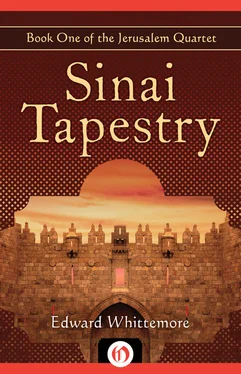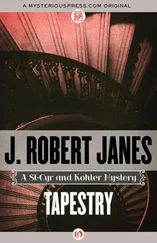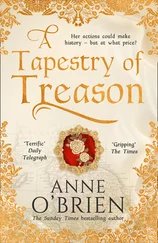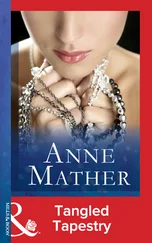And the strange muddled story about his former secretary that obsessed him, that he repeated over and over, how Theresa had gone to a place called Ein Karem in Palestine, there to suffer some kind of terrible self-inflicted penance in an Arab leper colony.
It was inexplicable. How could people change so much?
Stern shook his head. It wasn’t time to speak, her memory of standing beside the water was too recent. Sivi? Yes he had known him once, anyone who had ever spent any time in Smyrna had known Sivi. Yes and Theresa too. He nodded for her to go on.
Kind and gentle Sivi, totally broken when she found him, grave and sad and bewildered, living in a small squalid room near the Bosporus, so confused he often forgot to feed himself.
She had decided to devote herself to caring for him, it was the best thing she could do. She cleaned for him and washed and cooked, and for a while she felt stronger. Helping Sivi gave life some meaning again. But then that awful rainy afternoon came when she went to pick him up at the hospital after work as she did every day and found him strapped to a bed, beyond the impenetrable barrier of madness, the same afternoon Stern had found her by the water.
And now after forty-three years what did she have?
The memory of one exquisite month long ago on the shores of the Gulf of Aqaba. That and the son she had conceived there.
Would you like to meet him? asked Maud.
Yes very much.
She looked at him shyly.
Please don’t laugh. I named him Bernini. The dreams were crumbling but not quite gone. I suppose I hoped someday he would also carve his own beautiful fountains and stairways to somewhere.
Stern smiled.
And why not? It’s a good name.
But Maud looked suddenly troubled. She took his hand and said nothing.
In the small apartment above the Bosporus, Stern tried to amuse the boy with stories from his childhood. He described the first clumsy balloon he had built when he was about Bernini’s age.
Did you fly?
For a yard or two, depending on how hard I pushed. After that I just went bumping down the hillside.
Why didn’t you put wheels on the basket? Then you could have used it as a sailboat and crossed the desert that way.
I could have I suppose, but I didn’t. I kept trying to build better balloons and after a while I made one that would fly.
I wouldn’t have done that, said the boy distantly. Sailing would have been good enough for me.
They were sitting on the narrow terrace. Maud came out with tea and the boy lay down on his stomach and gazed at the ships plowing up and down the straits. When Stern left, Maud walked to the corner with him.
He’s often like that, I don’t know how to explain it. He talks for a minute or two about something and then drops it as if he were afraid to say too much, as if by touching certain thoughts he was afraid they would go away. He wouldn’t ask you why you wanted to fly for example, nor would he tell you why he would have preferred to sail. Instead he just lay down and watched the boats. I knew his imagination was working and he was thinking about those things, but he wouldn’t talk about it with us.
He’s young.
But not that young and sometimes it frightens me. His thoughts don’t always follow each other, somehow the sequence is wrong. Again it’s as if he were leaving things out on purpose. In school he can’t get along at all except for drawing.
Stern smiled.
With his name that’s fine.
But Maud didn’t smile.
No. He used to draw at home and now he doesn’t even do that anymore. He just lies on his elbows and gazes at things, especially the boats. And there’s something worse, he can’t read. Doctors say there’s nothing wrong but he can’t seem to learn. I mean he’s already twelve years old.
She stopped. Stern put his arm around her. He didn’t know how to help.
Listen. He’s healthy and good-natured and even though he may be a little too much inside himself right now, that’s not necessarily bad or wrong. After all he seems happy enough and isn’t that the most important thing?
There were tears in her eyes.
I don’t know. I just don’t know what to do.
Well at least you could share the burden. Why not get in touch with the boy’s father? He’s still in Jerusalem, near enough.
She moved her feet uneasily.
I couldn’t do that. I’m too ashamed of the way I treated him.
But that was twelve years ago, Maud.
I know but I still couldn’t bring myself to do it. I was too cruel to him and none of it was his fault. That would take a kind of strength I don’t have yet.
Stern looked at the ground. She took his hands and tried to smile.
Well don’t worry about it. It’ll be all right.
Good, he said in a soft voice. I know it will be.
And now you’re going to be away for a while?
He grinned.
It shows that desperately?
A man on his travels, yes.
About a month probably. I’ll cable.
Bless you, she whispered, for being who you are.
She went up on her tiptoes and kissed him.
Stern used to tell her how his father had somehow managed to mark his memory as a child with every name and event from his long years of wandering, in the course of time narrating his entire journey much as a blind man might have done in the days when there was no other way for the stages of the past to be passed from generation to generation, in effect rewriting the haj of his life in indelible ink upon his young son’s mind, swirling stroke around stroke in the complex etching of a spiritual stylus.
Yet strangely in those myriad experiences, those majestic flowing volumes that together comprised Strongbow’s legendary voyage through the desert, never once had the old explorer talked about the gentle Persian girl he had loved so dearly in his youth for a few weeks, no more, before she was carried off in an epidemic. Why?
Why should he have? answered Maud. He had loved her, that’s all, what more was there to say? Besides, when we look back on it there are always mysteries in someone’s life and perhaps the gentle Persian girl is his.
You may be right, said Stern vaguely, standing and then sitting down again. But Maud didn’t think he was really talking about the Persian girl and Strongbow. There had to be something else on his mind the way he was acting, something much more personal. She waited but he didn’t go on.
What else did he never mention? she said after a moment.
It’s very curious, but the Sinai Bible of all things. Surely he knew about it. Why that one secret held back?
Why do you think?
Stern shrugged. He said he couldn’t imagine why. He got up again and began roaming around the room.
When did he die? I don’t think you’ve ever told me that.
August 1914, the very month the nineteenth century came to an end. You know I remember that prophecy you said O’Sullivan Beare’s father made two months before that, that seventeen of his sons were going to be killed in the Great War. Well Strongbow must have had the gift too. He was ninety-five years old and he’d gone blind by then but his health was good and his mind was certainly as clear as ever. The main thing seemed to be simply that he felt he’d lived long enough. I was there with him in Ya’qub’s old tent during those last days and that’s exactly what he said. It’s enough.
Ya’qub had already died?
Yes, but only a few months before, the two of them inseparable to the end, always talking and talking over their endless cups of coffee. Anyway, after he said it was enough he did something that couldn’t have been a coincidence.
Stern frowned and lapsed into silence. He seemed to drift away.
Well?
I’m sorry, what?
The thing he did, what was it?
Читать дальше












